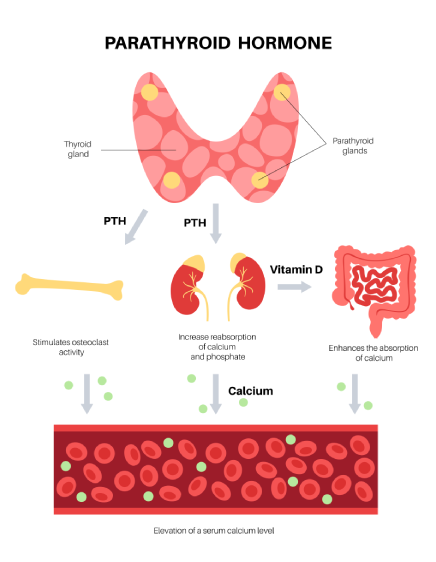Hyperparathyroidism: Understanding the Overactive Parathyroid Glands

Hyperparathyroidism is a condition characterized by the overproduction of parathyroid hormone (PTH) from the parathyroid glands. These small, pea-sized glands play a vital role in regulating calcium levels in the body. When they become overactive, it can lead to several health complications. In this blog, we will highlight the causes, symptoms, diagnosis, and treatment options for hyperparathyroidism.
Causes and Types of Hyperparathyroidism:
Primary hyperparathyroidism, the most common type, occurs when a benign (noncancerous) tumor forms on one or more of the parathyroid glands, causing excessive PTH production. Secondary hyperparathyroidism arises as a compensatory response to low blood calcium levels due to underlying conditions such as kidney failure or vitamin D deficiency. Tertiary hyperparathyroidism is a result of prolonged secondary hyperparathyroidism. Although rare, it occurs when the parathyroid glands become hyperactive even after the underlying condition is resolved.
Symptoms and Diagnosis:
The symptoms of hyperparathyroidism can vary but often include fatigue, weakness, bone pain, kidney stones, frequent urination, and gastrointestinal issues. However, some cases may not result in noticeable symptoms. Diagnosis typically involves blood tests to assess calcium and PTH levels, as well as imaging studies like ultrasounds, CT scans and nuclear scans to locate abnormal parathyroid glands.
Treatment Options:
Treatment for hyperparathyroidism depends on the type and severity of the condition. In primary hyperparathyroidism cases, surgical removal of the abnormal parathyroid gland(s) is the primary treatment option. Secondary hyperparathyroidism is managed by addressing the underlying cause, such as kidney transplantation or vitamin D supplementation. Medications can help manage symptoms or reduce bone loss in certain cases. Regular monitoring of calcium and PTH levels is essential.
Hyperparathyroidism can have a significant impact on one’s health and well-being. Early diagnosis and appropriate treatment are crucial for effectively managing this condition and preventing complications such as osteoporosis and/or kidney damage.

